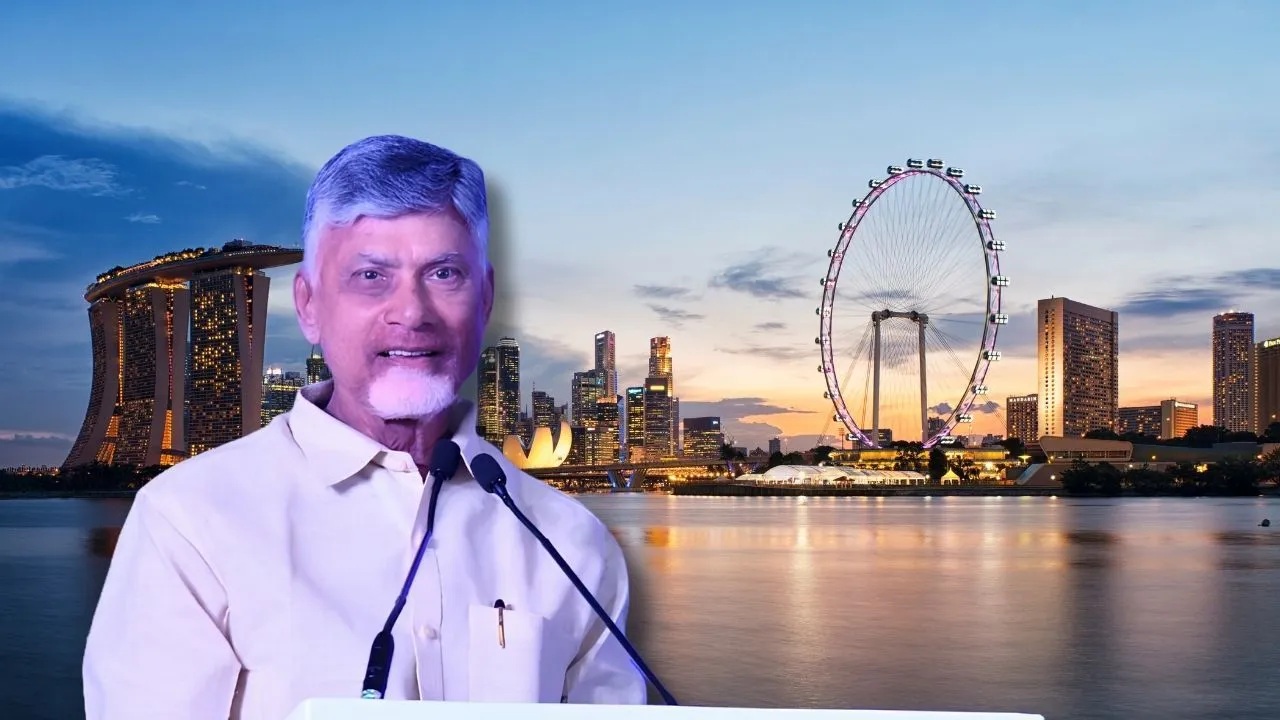At the Cabinet meeting held on Thursday, 24 July, the chief minister reportedly expressed regret that the goodwill he had cultivated painstakingly was eroded under the YSRCP dispensation.
Published Jul 25, 2025 | 5:20 PM ⚊ Updated Jul 25, 2025 | 5:20 PM

Andhra Pradesh Chief Minister N Chandrababu Naidu will be leaving for Singapore on Saturday, 16 July.
Synopsis: Chandrababu Naidu is determined to rekindle the relationship Andhra Pradesh had with Singapore. He said his visit is intended to reassure potential investors that Amaravati is still a viable and vibrant project and that Andhra Pradesh remains a state of immense potential.
Andhra Pradesh Chief Minister N Chandrababu Naidu is set to embark on a five-day visit to Singapore on Saturday, 26 July, for rebuilding trust of the island nation and reviving investor interest in the state.
Naidu, who had banked heavily on Singapore’s expertise during his first term (2014–2019) to shape Amaravati, is worried over the government losing its credibility and momentum in the state’s relations with Singapore under the previous YSRCP regime.
At the state cabinet meeting held on Thursday, 24 July, the chief minister reportedly expressed regret that the goodwill he had cultivated painstakingly was eroded under the YSRCP dispensation. He recalled Singapore offering a master plan for Amaravati free of cost.
“We were ready to begin construction after identifying the startup area, but the change in government derailed the Amaravati project,” Naidu said.
Although Singapore is currently hesitant to resume its role in the development of the startup area, Naidu is determined to rekindle the relationship. He said his visit is intended to reassure potential investors that Amaravati is still a viable and vibrant project and that Andhra Pradesh remains a state of immense potential.
During his earlier term, Naidu’s government had signed a Memorandum of Understanding (MoU) with a Singapore consortium for the development of a 6.84 sq. km. Startup Area within the seed capital region of Amaravati. However, after the YSRCP assumed power in 2019, the agreement was terminated, disrupting the partnership.
Despite Singapore’s current reservations, Naidu said he would explore avenues to utilize that country’s services in Amaravati’s development in other capacities.
Municipal Administration Minister P Narayana, who inspected ongoing works in Amaravati on Friday, 25 July, launched a scathing attack on the previous YSRCP government for damaging ties with Singapore. He recalled the TDP in its first term allotting 1,450 acres for Amaravati’s development under the Swiss Challenge method in a 42:58 ratio, aimed at attracting top-tier companies and banks to boost employment.
He accused the YSRCP of driving Singapore officials away and even initiating legal action against them, effectively halting progress. “The previous government lacked the vision to build a city like Amaravati,” Narayana said.
To counter the perception that Amaravati has been stalled, Narayana reaffirmed the current government’s commitment to completing the capital project. “By March 2026, all essential government buildings and infrastructure facilities will be in place,” he declared.
Narayana, who went around Nelapadu, reviewed the construction of residential quarters for gazetted and non-gazetted officers and Group-D employees. He examined the progress of Type-1 and Type-2 quarters and held discussions with officials overseeing the work.
The minister slammed the previous administration’s policies, stating they had inflicted substantial economic damage and led to a misuse of public funds. He noted that the current government had to spend nearly a year fixing legal, contractual, and procedural issues left behind. Instead of cancelling earlier tenders, the state formed committees to resolve disputes with contractors and ensure timely payments.
In a technical boost to the project, expert committees from IIT-Madras and IIT-Hyderabad were roped in to assess the structural integrity of partially completed buildings. Based on their recommendations, fresh tenders were issued and construction resumed.
Currently, around 10,000 workers are engaged in construction activities across Amaravati. The project is backed by sufficient machinery and technical resources. According to Narayana, 21 towers comprising 1,995 flats for non-gazetted officers are under construction, with nine towers already completed and the remaining expected to be ready by December 2025. For gazetted officers, 14 towers with 1,140 flats are underway—11 of which are already complete.
Infrastructure development is progressing alongside residential construction. Roads, drainage, and potable water supply systems are being put in place to support the growing township. Narayana stated that once approximately 4,000 flats are completed, Amaravati would become a fully functional township with essential services.
Besides housing and government offices, plans are underway to make Amaravati a self-sustaining capital with robust healthcare and educational infrastructure. Both SRM and VIT Universities are establishing medical colleges in the region, each equipped with 50-bed hospitals that are expected to become operational by March 2026. The universities will also start CBSE-affiliated schools by the next academic year, bolstering the city’s educational ecosystem.
Addressing the concerns of farmers who contributed land to the Amaravati project, Narayana assured that development work on their allocated plots would begin soon. Tenders for the same have already been finalised. Despite minor delays due to seasonal rains, the government is pressing ahead with plans for 360 km of trunk roads and 1,500 km of layout roads. Key water management infrastructure—including the Kondaveeti Vagu floodwater project, Palavagu system, and the gravity canal—is progressing rapidly, the minister said.
(Edited by Majnu Babu).
